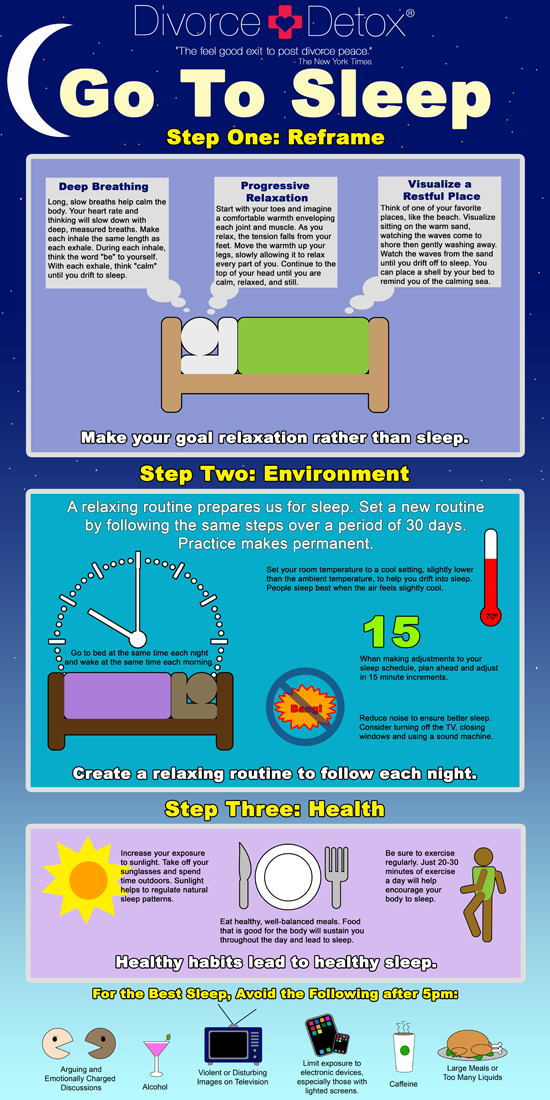
Sleep is one of our most precious resources, yet a good night's sleep can be hard to come by during divorce. Sleep helps to restore balance to the body and mind. It regulates chemical processes and produces melatonin, a chemical that helps us heal. Sleep also resets the brain, allowing it to create new memories and learn new things. Serotonin and dopamine levels rise during sleep allowing for more upbeat attitudes and calmer thinking. These chemicals make us feel energetic and help to regulate health. Leptin is replenished and helps balance food intake and energy expenditures. During sleep, cortisol levels decrease, helping relieve stress and curb premature aging. We need sleep to renew our energy and heal during the divorce transition.
Step One: Reframe
The first step to readjusting your sleep is reframing the way we think about it. For many, sleep is an activity with a goal. The problem is that when we fail to reach that goal, our mind and body react to the failure which causes more sleep loss. Reframing sleep to relaxation changes the goal. If sleep eludes you, accept it without judgment. Next, move on to the activity of relaxing. With relaxation as your goal, you can begin to prepare yourself for sleep, rather than demanding it from yourself, which rarely works.
Here are 3 exercises to relax:
- Deep Breathing: Long, slow breaths help calm the body. Slow breaths send messages throughout the body that say, "I am calm." Your heart rate and thinking will slow down with deep, measured breaths. Make each inhale the same length as each exhale. During each inhale, think the word "be" to yourself. With each exhale, think "calm." Long and slow, "be... calm..." until you drift to sleep.
- Visualize a Peaceful Setting: Imagine a quiet, picaresque setting and simply watch it. Visualize sitting on the warm sand, watching the waves come to shore then gently wash away. Watch the waves from the sand until you drift off to sleep. You can place a beautiful shell by your bed to remind you of the calming ocean.
- Relax Your Body: Progressively focus on each part of your body, willing it to relax. Start with your toes and imagine a comfortable warmth enveloping each toe, joint, and muscle. As you relax, the tension falls from your feet. Move the warmth up your feet and into your ankles, slowly allowing it to flow into your calves and up your knees, relaxing each part of you. Continue throughout your body to the top of your head until your whole self is calm, relaxed, and still.
- Set a regular bedtime. Your body will become accustomed to a schedule rather quickly.
- Wake at the same time each morning. ***Make changes to your sleep schedule in 15 minute increments over a period of up to seven days. Plan ahead and adjust slowly for the maximum amount of rest.***
- Think of sleep as a 90 minute cycle rather than a set of hours. A full sleep cycle is more restful to your body than a sleep cycle and a half. Aim for five or six sleep cycles per night. This will help keep your body and mind feeling good throughout the day.
- Reduce noise. Turn off the television and shut open windows. Take steps to reduce the noise level around you. Sounds often ignite the fight or flight response. The less noise around you, the less likely you are to wake suddenly. I recommend Sleep Stream 2 on iTunes.
- Set your room temperature to a cool setting, slightly lower than the ambient temperature to help you drift into sleep. People sleep best when the air feels slightly cool.
- Make sure your bed is comfortable. Use clean bed linens and make sure your mattress is cozy. Discomfort often causes people to wake in the night. You may consider purchasing a pillow top and cotton sheets for your mattress.
Step Three: Health
Health plays a significant role on sleep. During divorce, many stop exercising and eating well. The feelings of anger and sadness often curb appetites and make people feel less in the mood to be active. This in turn affects sleep and creates a pattern that can quickly become a habit. During the divorce transition, we can avoid developing insomnia and depression by practicing a few simple rules for our well being.
- Increase your sunlight exposure. Take off your sunglasses and do more activities outside. The sun plays an important role in regulating our sleep cycles.
- Take Vitamin D. While many physicians recommend between 600 and 800 IU a day. In The Vitamin D Revolution, Dr. Soram Khalsa recommends between 2,000 to 4,000 UI per day due to the multitude of benefits vitamin D gives to the body.
- Eat healthy, well balanced meals. Lean meats, vegetables, fruits and grains are all part of a well balanced diet. Sugars and fried foods may upset your body chemistry and sleep.
- Exercise. Exercise keeps your body healthy and energized. It also aids in sleep. Exercise also affects the mind and will help to clear the negative thoughts that often accompany divorce.
- Consult your physician if insomnia persists. Lack of sleep can affect your long term health.
- Emotionally charged conversations
- Large meals
- Alcohol
- Caffeine
- Too many liquids.
- Limit exposure to electronic devices, especially those with back lit screens.
References
Burke, Stephanie. "11 Unconventional Sleep Tips: How to Get to Sleep and Stay Asleep." SpineHealth.com. December 6, 2012.
Collinge, William, MPH, PhD, "Sleep's Healing Properties." CNN.com. August 25, 1999
Fountain, Henry. "Study Gives Key Role to Sleep in Helping Brain Learn Anew." New York Times. January 29, 2008.
National Heart, Lung, and Blood Institute. "Why Is Sleep Important?" National Institutes of Health. February 22, 2012.
Small, Gary, MD. "Sleep Helps Protect Your Brain." Psychology Today, Online. February 7, 2012.
Smith, Melinda, MA, et al. "How to Sleep Better." Helpguide.com. May 2013.